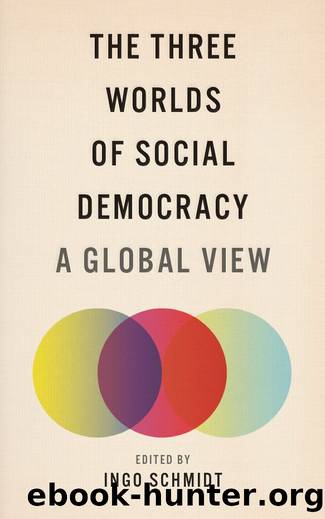The Three Worlds of Social Democracy by Schmidt Ingo

Author:Schmidt, Ingo. [Schmidt, Ingo.]
Language: eng
Format: epub
ISBN: 9781783719808
Publisher: Book Network
Published: 0101-01-01T00:00:00+00:00
ACKNOWLEDGEMENT
I thank Professor Vassilis Droucopoulos for his comments on an earlier version of this chapter.
NOTES
1. PASOK stayed in power during the following time periods: 1981â89, 1993â2004, 2009â11. In the period 2011â15 PASOK participated in coalition governments with various parties, the conservative New Democracy being the main partner.
2. SYRIZA was until then a small radical left party (4.6 per cent in the national elections of 2009) (see also below).
3. New Democracy elected 76 MPs and PASOK 13 MPs. Other parties in the parliament: Golden Dawn (Nazis) 6.3 per cent and 17 seats, To Potami (liberals) 6 per cent and 17 seats, KKE (Communist Party of Greece) 5.5 per cent and 15 seats.
4. Other parties in the new parliament: Golden Dawn 6.9 per cent and 18 seats, PASOK 6.28 per cent and 17 seats, KKE 5.55 per cent and 15 seats, To Potami 4.09 per cent and 11 seats, Union of the Centre 3.43 per cent and 9 seats.
5. M. Mazower (ed.) (2000). After the War Was Over. Reconstructing the Family, Nation, and State in Greece, 1943â1960. Princeton and Oxford: Princeton University Press.
6. From this viewpoint the following announcement by the Administrative Committee of EDA, at the time of acceptance of Greeceâs application to join the European Economic Community (EEC) in 1959, is entirely typical: âThe desire and the aspiration of our partners in the Common Market is that Greece should remain a backward agricultural country, a source of raw materials and a market for their industrial products ⦠For 75% of our backward and over-protected industry ⦠it is the difference between life and deathâ (Avgi, 1 August 1959). Three days before this (29 July 1959) the editors of Avgi had forecasted an even less auspicious future: âNo business is going to survive this relentless competition. Any that are not absorbed by the trusts will become their appendages and will be annihilated.â
7. See E. Ioakimoglou and J. Milios (1993). âCapital Over-accumulation and Economic Crisis: The Case of Greece (1960â1989)â. Review of Radical Political Economics, 25 (2) (June): 81â107.
8. See J. Milios and D.P. Sotiropoulos (2010). âCrisis of Greece or Crisis of Euro? A View from the European âPeripheryââ. Journal of Balkan and Near Eastern Studies, 12 (3): 223â40. J. Milios and D.P. Sotiropoulos (2009). Rethinking Imperialism: A Study of Capitalist Rule. London and New York: Palgrave Macmillan.
9. See D.P. Sotiropoulos, J. Milios and S. Lapatsioras (2013). A Political Economy of Contemporary Capitalism and its Crisis. Demystifying Finance. London: Routledge: Chapter 9.
10. In February 1968, the exile Communist Party of Greece (KKE) was split into two parts: the pro-Soviet âKKEâ and âKKE (interior)â, which shortly after espoused the Euro-communist line.
11. For an analysis of the class character and the inner rationality of neoliberalism and austerity as profit raising and power redistribution strategies, see S. Lapatsioras, J. Milios and D.P. Sotiropoulos (2015). âAddressing the Rationality of âIrrationalâ European Responses to the Crisis. A Political Economy of the Euro Area and the Need for a Progressive Alternativeâ. In A. Bitzenis, N. Karagiannis and J. Marangos (eds), Europe in Crisis.
Download
This site does not store any files on its server. We only index and link to content provided by other sites. Please contact the content providers to delete copyright contents if any and email us, we'll remove relevant links or contents immediately.
Killers of the Flower Moon by David Grann(3228)
Machine Learning at Scale with H2O by Gregory Keys | David Whiting(2267)
Will by Will Smith(2033)
Guns, Germs and Steel by Diamond Jared(1876)
Borders by unknow(1780)
The Room Where It Happened by John Bolton;(1717)
The Color of Law by Richard Rothstein(1574)
Once Upon a Broken Heart by Stephanie Garber(1472)
Water Rights and the Environment in the United States by John Burch(1414)
Examples & Explanations: Administrative Law by William F. Funk & Richard H. Seamon(1324)
Friends, Lovers, and the Big Terrible Thing by Matthew Perry(1324)
A Short History of War by Jeremy Black(1295)
Pharmacy Practice and The Law by Richard Abood(1252)
HBR's 10 Must Reads 2022 by Harvard Business Review(1251)
That Every Man Be Armed by Stephen P. Halbrook(1236)
The Strength In Our Scars by Bianca Sparacino(1234)
The Guarded Gate by Daniel Okrent(1219)
515945210 by Unknown(1205)
Injustices by Ian Millhiser(1197)
